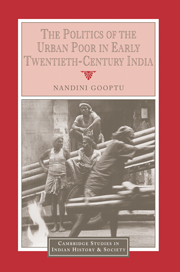Book contents
- Frontmatter
- Dedication
- Contents
- List of tables
- Acknowledgements
- List of abbreviations
- Select of glossary
- 1 The study and its perspectives
- Part I Changing contitions and experiences in interwar north India
- Part II Modes of political action and perception
- 5 Untouchable assertion
- 6 Militant Hinduism
- 7 Resurgent Islam
- 8 Nationalist action
- 9 Congress socialist mobilisation
- 10 The politics of exculsion and the ‘virtuous deprived’
- Bibliography
- Index
9 - Congress socialist mobilisation
from Part II - Modes of political action and perception
Published online by Cambridge University Press: 05 July 2014
- Frontmatter
- Dedication
- Contents
- List of tables
- Acknowledgements
- List of abbreviations
- Select of glossary
- 1 The study and its perspectives
- Part I Changing contitions and experiences in interwar north India
- Part II Modes of political action and perception
- 5 Untouchable assertion
- 6 Militant Hinduism
- 7 Resurgent Islam
- 8 Nationalist action
- 9 Congress socialist mobilisation
- 10 The politics of exculsion and the ‘virtuous deprived’
- Bibliography
- Index
Summary
The emergence of the Congress Socialist Party (CSP) added a new edge and a different dimension to Congress nationalism from the mid-1930s. The CSP was formally inaugurated in May 1934 at Patna, mainly by Congressmen who were sceptical about the efficacy of the Gandhian ‘constructive programme’ for mass mobilisation in the years after the Civil Disobedience movement. Explaining the reasons for the emergence of the party, Sampurnanand, a CSP leader of UP, wrote in his memoirs:
It was felt that the adoption of a socialist objective would rally the lower middle classes, the landless peasantry, the mill hands and other socially and economically backward classes to the ranks of the Congress in our final fight for freedom … people felt that somehow socialism would provide a break-through from the dead end which Congress strategy seemed to have reached.
The CSP favoured an agitational programme to draw in the support of the masses by addressing social and economic issues. This was a counter to the ‘constitutionalism’ of the so-called ‘right wing’ of the Congress and their decision to participate in the legislatures, which was endorsed at the All India Congress Committee (AICC) session in May 1934. One of the declared aims of the CSP was ‘to rescue the Congress from the hands of the right wing … and to carry on a constant propaganda for the exposure of the reactionary aims, policies and programme of the right wing group’.
- Type
- Chapter
- Information
- The Politics of the Urban Poor in Early Twentieth-Century India , pp. 365 - 419Publisher: Cambridge University PressPrint publication year: 2001
- 1
- Cited by



